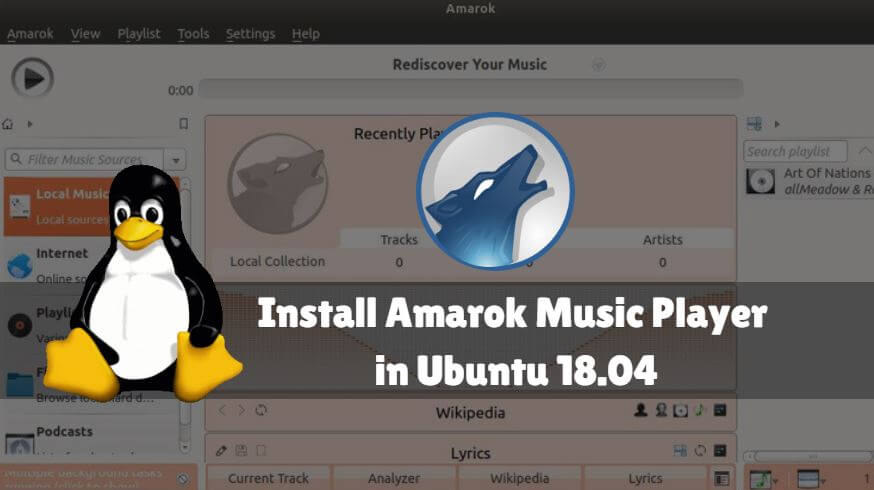

- #UBUNTU MUSICPLAYER HOW TO#
- #UBUNTU MUSICPLAYER INSTALL#
- #UBUNTU MUSICPLAYER SOFTWARE#
- #UBUNTU MUSICPLAYER FREE#
mp3 when specifying the files you want to play. Ogg123 works in exactly the same way, and uses the same options, as mpg123. ogg123 is part of a suite of applications called vorbis-tools, which comes pre-installed with a number of Linux distributions. If you're adamant about using truly open formats, then you'll want to go with Ogg Vorbis for your music. You can also load a playlist file and use the *-z* option on the command line to shuffle the tracks you want to play. Just go to the folder containing the MP3 files that you want to play and type mpg123 *.mp3. In fact, the only difference between the two applications is the file formats they support.

I've lumped them together because both applications are very similar. If you want a quick and dirty way to play music files, then mpg123 and ogg123 are good options. How intuitive? You press n to play the next track in your list or p to play the previous one, and press S to set MOC to shuffle tracks. MOC's keyboard shortcuts are quite intuitive. The left pane lists the tracks in a folder, while the right pane contains the contents of a playlist file (if there is one in the folder). MOC (short for Music on Console) is a dual-pane music player that's similar to cmus.

It uses keyboard shortcuts inspired by vi (for example, :add ~/music to load a folder) and you manuever through tracks by pressing the j and k keys. If you're a fan of the vi editor, you'll be right at home in cmus. You can also use cmus' built-in search function to look for music in your /home directory and you can switch between several different layouts. It organizes your music by either musician or album title, and lets you load playlist files. cmusĬmus is a fast and flexible music player. How? Here's a look at three command-line music players. If you're using older hardware, command-line tools are an excellent alternative to graphical applications since they don't use too many resources. Having said that, working at the command line can make certain tasks faster and more efficient.
#UBUNTU MUSICPLAYER FREE#
Free online course: RHEL Technical Overview.

To remove Amberol, open terminal and run command: flatpak uninstall -delete-data io.bassi.AmberolĪnd/or remove G4Music by running command: flatpak uninstall -delete-data. Once installed, search for and open the music player from Activities overview and enjoy!
#UBUNTU MUSICPLAYER INSTALL#
Both players will install GNOME 42 run-time libraries if not exist. Or install G4Music if you like the search function and pipewire audio sink. Other Linux may follow the official setup guide to install the daemon.Ģ.) To install the Amberol, run the command below in terminal window: flatpak install Then, run the command below to install the flatpak daemon: sudo apt install flatpak The players are available to install as universal Flatpak packages, which work in Ubuntu, Fedora, Debian, and most other Linux systems.ġ.) Firstly, press Ctrl+Alt+T on keyboard to open terminal.
#UBUNTU MUSICPLAYER HOW TO#
How to Install Amberol or G4Music in Ubuntu & other Linux: And, it supports samba and any other remote protocols as well as pipewire audio sink. However, it has more features, including search music from large collection, sort by album/artist/title or shuffle.
#UBUNTU MUSICPLAYER SOFTWARE#
It’s so far a single developer software project, while Amberol has a small group of contributors. G4Music is Amberol inspired music player with quite similar user interface. It just play local music, with basic functions like shuffle and repeat, MPRIS integration, drag and drop from file manager and GNOME integration. No music collection or playlist management, no metadata editor, no lyrics. The player aims to be as small, unintrusive, and simple as possible. Amberol:Īmberol is a GTK4 app uses libadwaita library as well as gaussian blurred cover background for the beautiful app window. Amberol and G4Music are two of them with really good looking UI design. There are quite a few music player applications for Linux.


 0 kommentar(er)
0 kommentar(er)
